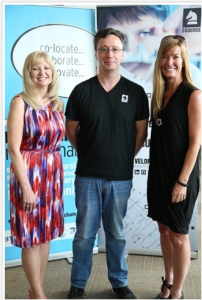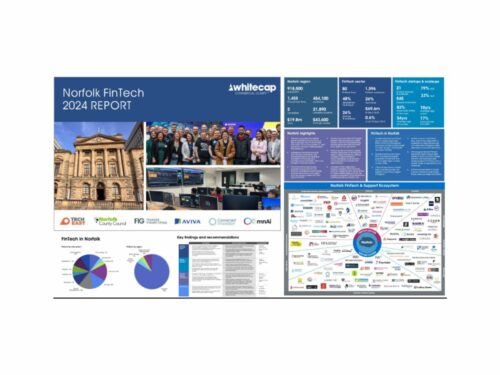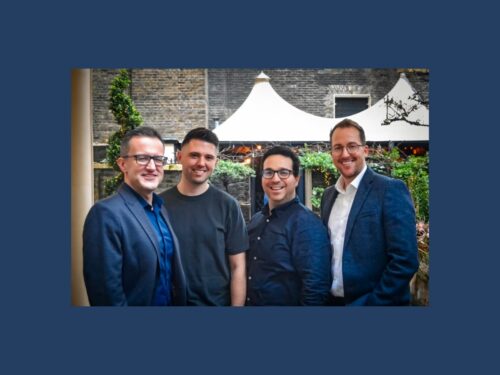Report predicts emerging FinTech cluster could be worth £100M within three years. A FinTech report* released last week...
Innovation in Ipswich: TechEast explores Suffolk’s tech scene
As the premier support organisation for tech businesses across East Anglia, our reach extends across Norfolk, Suffolk, Cambridge, and part of Essex.
Though united by a strong tech presence, each county has its own distinct feel. For the region to thrive, we think its essential to consider each county individually, helping them navigate the distinct challenges they face.
In this month’s blog, we’re putting the Ipswich and Suffolk tech cluster in the spotlight. To the rest of the country, Suffolk is well known for its agricultural heritage – Ipswich Town Football Club proudly refer to themselves as the ‘Tractor Boys’. However, tech actually employs more people in Suffolk than local farms – 14,715 work in digital jobs versus 2,200 in agriculture.
The recently published Tech Nation Report 2018 paints a glowing picture of Suffolk’s tech scene. In 2017, digital businesses contributes £372m to the UK economy – up from £163m the year before. Tech businesses in Suffolk turned over £250m in 2017, with each tech employee turning over £88k. In Ipswich, there are 2,852 jobs in the digital tech sector, and 14,715 digital tech jobs across sectors.
The Innovation Hub: Innovation Martlesham

The focal point for Suffolk’s tech scene is Innovation Martlesham, on the outskirts of Ipswich.
Based at Adastral Park, the home of BT’s R&D team, Innovation Martlesham describes itself as a “collaborative ecosystem” for digital businesses. As well as a business incubator, the facility features hot-desking, co-working, and office space for tech companies.
Innovation Martlesham is home to over 100 digital businesses, including TechEast members Coderus, Staylists, Inn Style, IF Recruitment and Inawisdom. In fact, Inawisdom was the first ever business to enter the IM Accelerator in 2016 with a team of two people. They now have 26 employees, with revenue growing fourfold year-on-year.
With its green spaces and modern facilities, Innovation Martlesahm at Adastral Park is undoubtedly a pleasant place to work. However, that’s not all the tech campus has to offer.
Lisa Perkins, director of strategic research and innovation at BT and TechEast board member, oversees the Innovation Martlesham ecosystem. Lisa describes the cluster as the “premier environment for forward-looking global organisations… and some of the most exciting and dynamic start-ups operating within the sector.”
She continues: “We make connections that count to help our companies through technology, resource, collaboration and channel opportunities. We nurture young companies by providing incubation and acceleration facilities, mentoring, showcasing opportunities, and introducing investment prospects. We create a network and platform for them to thrive. We also aspire to make a positive impact to investment and jobs in the UK.”
Mark Thomas, founder of Coderus, said: “We love being part of the Innovation Martlesham ecosystem at Adastral Park. There’s a positive atmosphere, and being in close proximity to other like-minded businesses sparks regular collaboration and discussion – you never know who you’re going to bump into!”

Big players
Collaboration is an essential part of tech everywhere – Suffolk is no different. The startups and SMEs of Innovation Martlesham benefit from the close proximity to the region’s big players in tech.
Since 1975, BT’s research and innovation team has been based at Adastral Park. The firm is a significant employer in the region, with over 3,000 employees. Earlier this year, BT announced the creation of an additional 150 apprenticeships and graduate jobs at Adastral Park, too.
BT isn’t the only large tech firm with Adastral Park. Indian IT firm, Tech Mahindra, partnered with BT to invest in a ‘Marker’s Lab’ at Adastral Park. The R&D facility will focus on topics such as AI, machine learning, and 5G roll out.
There are also a number of large telecoms firms with teams based at Innovation Martlesham: including Huawei, Nokia, Ericsson, Intel, and O2. The close proximity even sparks collaboration between the big players: BT is currently engaged on a £25m five-year partnership with Huawei and the University of Cambridge to explore communications tech.
Suffolk also has its share of big tech names beyond Adastral Park. The world’s largest game software firm, Derivco, has based its UK mainland office in Ipswich town centre. Founded in South Africa in 1996, Derivco has tripled since 2015 and expanded its Ipswich presence several times.

Education
Until 2007, Suffolk was the largest county in the UK without its own university. It may be a ‘young’ institution, but the University of Suffolk has gone from strength to strength over the last ten years.
Last academic year, the university had 5,080 students across its Ipswich facility and satellite campuses in Lowestoft, Bury St Edmunds, and Great Yarmouth. According to the Complete University Guide, Suffolk University is “defined by its modern, forward-thinking and responsive attitude to the changing world around us.”
As well as being an up-and-coming education institution, the University of Suffolk has strong links to the business sector. The University of Suffolk is an education partner of the New Anglia LEP’s Digital Skills Plan, assisted by TechEast.
The university has also established the Ipswich Waterfront Innovation Centre to encourage nurture ICT startups and entrepreneurs. As well as offering office space (including a reduced rate for graduate entrepreneurs), the centre helps facilitate student internships and placements.

Support
Support for businesses in East Anglia – including Suffolk – includes topdown input from the New Anglia Local Enterprise Partnership. The LEP works between local authorities, education institutes and businesses to support and grow business in Norfolk and Suffolk.
The LEP is striving to create an additional 88,000 jobs and 30,000 new businesses through its digital skills plan initiative. This is in line with TechEast’s vision to place East Anglia as a top five UK tech cluster by 2020, so we are pleased to support the LEP as convenor to the digital skills task force.
Ipswich and Suffolk also have many ‘grassroots level’ support events and meet up groups for the tech community. For the first time this year, the DevEast developers’ conference took place at Ipswich’s Portman Road football stadium. The sell out event, organised by the Digital East Anglia meet up group, is already confirmed to return in 2019.
Other tech meet up groups in the county include SyncIpswich, Suffolk Internet Marketing Specialists (SIMs) and Suffolk Developers.
And finally, the Creative Computer Club allows young people from Suffolk to explore an interest in technology while gaining new skills (and having fun, too).
Adastral Park also hosts regular events for the Ipswich tech community. Back in April, Innovate UK brought their flagship Innovate UK in the East of England event to Adastral Park. Innovate UK is a government agency that provides funding and support for STEM innovation. The event explored how ‘Industry 4.0’ and connectivity will impact the future of business.
Earlier this month, Coderus hosted their annual live streaming event of the Google I/O Developers’ Conference at Adastral Park. They’re also hosting a live stream of the Apple Developers’ Conference at the University of Suffolk in June.

Overcoming challenges
Like every region, Ipswich’s tech sector has its challenges. According to the Tech Nation Report, access to talent, limited infrastructure, and poor transport links are the three biggest obstacles for firms in Suffolk.
These findings will be no surprise to those who live and work around Ipswich. Here’s Lisa Perkins’ take on the infrastructure challenges in Suffolk:
“Infrastructure is a key element to the successful growth of any region and its essential that continuous improvements are made to all the transport links we currently have. Specific areas such as road links that connect east to west, rail links to London, and congestion relief on major roads around Ipswich all need a strategic plan to ensure the necessary funding is made available from local or national funds in order to execute the strategy.”
While facilities like Innovation Martlesham and the Ipswich Waterfront Innovation Centre are blessed with super-fast broadband as standard, the rest of the county isn’t as lucky. Much of Suffolk is very rural, and homes and businesses can struggle for connectivity. The Better Broadband Suffolk, a partnership between Suffolk County Council and BT, is aiming to rollout fibre broadband to 97% of Suffolk.
Attracting talent from beyond the county is another big challenge. Lisa believes that regenerating Ipswich town centre would help “attract a younger band of people from across the country to become involved in our tech cluster” ensuring a “strong pipeline of young fresh innovative talent”.
Mark Thomas of Coderus believes the planned housing development adjacent to Adastral Park will help:
“If East Anglia’s tech scene is to continue to thrive, we need to maintain a steady flow of talent. Most likely, some of this will need to be recruited from outside the region. East Anglia currently has a housing shortage which needs to be resolved anyway, but this will also help attract serious players to Ipswich.”
We have no doubt that Suffolk will overcome its challenges and continue to thrive as one of many ‘hotspots’ in the East Again tech cluster. Despite the county’s challenges, Suffolk respondents to the Tech Nation Survey praised the appealing area, close proximity to a university, and helpful tech community.
New Norfolk FinTech cluster revealed as one of UK’s most significant InsurTech centres, outside of London
Do Your Team Need Coding & Web Development Training?
If you are struggling to train and retain your technicians, then you might need Netmatters’ Skills Bootcamp. Our...
Amazon Agency Optimizon Continues Expansion with Strategic Acquisition of Marketplace Power
LONDON – Optimizon, a leading Amazon and e-commerce agency in the UK, is thrilled to announce the successful...




